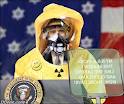Nuclear Plants Should Be Phased Out -
“Can’t Guarantee Against Accident Causing Widespread Land Contamination”
 Nuclear Regulators Just “Rolling the Dice”
Nuclear Regulators Just “Rolling the Dice”
Energy intelligence reports:
Former Nuclear Regulatory Commission (NRC) Chairman Gregory Jaczko says that the current fleet of operating plants in the US should be phased out because regulators can’t guarantee against an accident causing widespread land contamination. In two key decisions last week Jaczko said the agency “damaged significantly” its international reputation for upholding safety and he accused the five commissioners of “just rolling the dice” in dealing with severe accidents.
Jaczko is correct that “the current fleet of operating plants in the US [is unsafe] regulators can’t guarantee against an accident causing widespread land contamination”.
An investigation by Associated Press found that 75 percent of all U.S. nuclear sites have leaked radioactive tritium.
And whistleblowers at the Nuclear Regulator Commission say that the risk of a major meltdown at U.S. nuclear reactors is much higher than it was at Fukushima.
And an accident in the U.S. could be a lot larger than in Japan … partly because our nuclear plants hold a lot more radioactive material. Radiation could cause illness in huge numbers of Americans, and a major nuclear accident could literally bankrupt America.
And yet the nuclear regulators have dragged their feet in demanding even modest upgrades to prevent Fukushima-type disasters. We reported more than a year ago:
The geniuses at the Nuclear Regulatory Commission have given the green light for new nuclear power plants in the U.S. [over Jaczko's objections] which don’t include safety upgrades which were demonstrated vital by the Fukushima meltdown.
Jaczco explained last month:
I suggested putting in a requirement or a “condition” in the license, that said that they would not operate the plant until all of the Fukushima changes were implemented.
My colleagues on the commission rejected that proposal. Given that they rejected it, I had no choice but to disapprove issuing the licenses.
Bloomberg gave an update on last month:
U.S. nuclear regulators delayed action on a recommendation that utilities install radiation filters at 31 U.S. reactors, a victory for the industry that estimated the proposal may cost as much as $20 million per unit.
***
Representative Edward Markey, a Massachusetts Democrat and a critic of the nuclear industry, said the NRC is delaying what he called an important safety upgrade at about a third of the nation’s 104 operating reactors.
“The NRC has abdicated its responsibility to ensure public health and safety in New England and across the country,” Markey, who is running for Senate, said in a statement.
***
The Nuclear Energy Institute, a Washington-based industry group, had said adding filters on vents as proposed by the agency’s staff was among the most expensive upgrades required by the regulator. Exelon Corp. of Chicago owns 11 of the 31 reactors.
***
Edwin Lyman, senior scientist at the Union of Concerned Scientists, based in Cambridge, Massachusetts, said NRC staff had already made the case the filters were an important safety enhancement. The NRC’s decision “kicks the can down the road.”
***
Some European countries require installation of filter to block radiation on vents, Lyman said. Japan announced last year that filtered vents will be required on its reactors.
Indeed, the nuclear regulators actually weakened safety standards after the Fukushima disaster.
Jaczco makes some good points regarding nuclear:
The biggest problem with the NRC continues to be the heavy influence that the industry has in selecting the members of the commission. It is a very political process.There are few commissioners who ever get onto the commission who are not endorsed by the industry. [Indeed, all nuclear agencies are wholly controlled by (and serve) the nuclear industry … just like the Federal Reserve is owned by (and serves) its member banks.]
***
We need to rethink the current design to have better designs such as small modular reactors.
If we have a reactor that is 100 megawatts, the quantity of material and the energy we have to disperse that material is significantly reduced.
It will not contaminate a 10-kilometer radius area, because it does not have enough material. [We've previously noted nuclear power can be generated and then used locally at the neighborhood scale ... a lot safer than Tepco or GE can do it in a giant nuclear plant.]
***
Fundamentally, the way I look at it is that we know how to maintain nuclear fuel in the short term. For the most part, we think it maintains its integrity. It does not need a lot of active systems, and dry casks work very well as far as we know.
Dry casks would solve the storage problem, but – like the new filters which the NRC and nuclear energy are fighting – they would cost a little money.
Remember: Nuclear energy can be cheap, or it can be safe … but it can’t be both.
Nuclear power is being pushed because it is good for making bombs – even though it could not survive without massive government subsidies, and even though it won’t necessarily reduce carbon dioxide emissions.
Jaczko is correct that regulators are “just rolling the dice” in dealing with severe accidents, just as financial regulators rolled the dice in dealing with the economy, and oil regulators rolled the dice in dealing with deep-sea drilling. That never works out very well.
Copyright © Washington's Blog 2013





